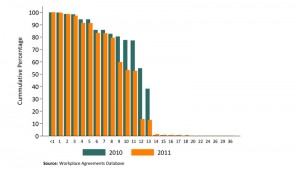Home » Commentary » Opinion » Employer PPL response not a scam
· Ideas@TheCentre
 The government’s handling of its Paid Parental Leave (PPL) budget measure shows a determination to alienate as wide a constituency as possible.
The government’s handling of its Paid Parental Leave (PPL) budget measure shows a determination to alienate as wide a constituency as possible.
Just days after agreeing that parents who make use of taxpayer funded PPL payments in addition to PPL workplace entitlements were engaged in `fraud’ the Treasurer doubled down and accused employers who tighten up their own PPL schemes in response to a reduction in the taxpayer funded payment of trying to `scam’ taxpayers.
Employers who respond to a reduction in PPL payments by reducing PPL workplace conditions are doing nothing of the sort.
What the Treasurer does not appear to understand is that, for those parents who have parental leave workplace entitlements, the PPL payment is effectively a $11,500 subsidy for this workplace condition.
While paid to employees rather than employers, the effect is the same. Workers require less generous parental leave entitlements from their employers — who are then in a position to offer less parental leave and more financial remuneration or better conditions in lieu.
As the figure below indicates, more than half of women on collective agreements in the private sector who had PPL workplace conditions were entitled to more than 12 weeks of leave in 2010. Following the introduction of PPL payments in 2011 this fell to 14%.
In restricting PPL payments to those whose workplace entitlements are less generous than 18 weeks of the full-time minimum wage, the government is reducing the level of subsidy for the 45,000 parents who will receive top-ups, and abolishing the subsidy altogether for the 34,000 parents with more generous conditions.
Employees who value their parental leave conditions are free to bargain with employers for more generous parental leave and will pay for it through reduced wages or other conditions. Others may place less value on parental leave and negotiate for more pay or other conditions.
There are good reasons to restrict PPL payments to those who need them and the available evidence would suggest the taxpayer is getting little value for money when it comes to PPL expenditure.
But to accuse employers of trying to `scam the government and scam taxpayers’ for a rational response to a reduction of the PPL subsidy that benefits their employees suggests the Treasurer does not understand how labour markets work.
Employer PPL response not a scam